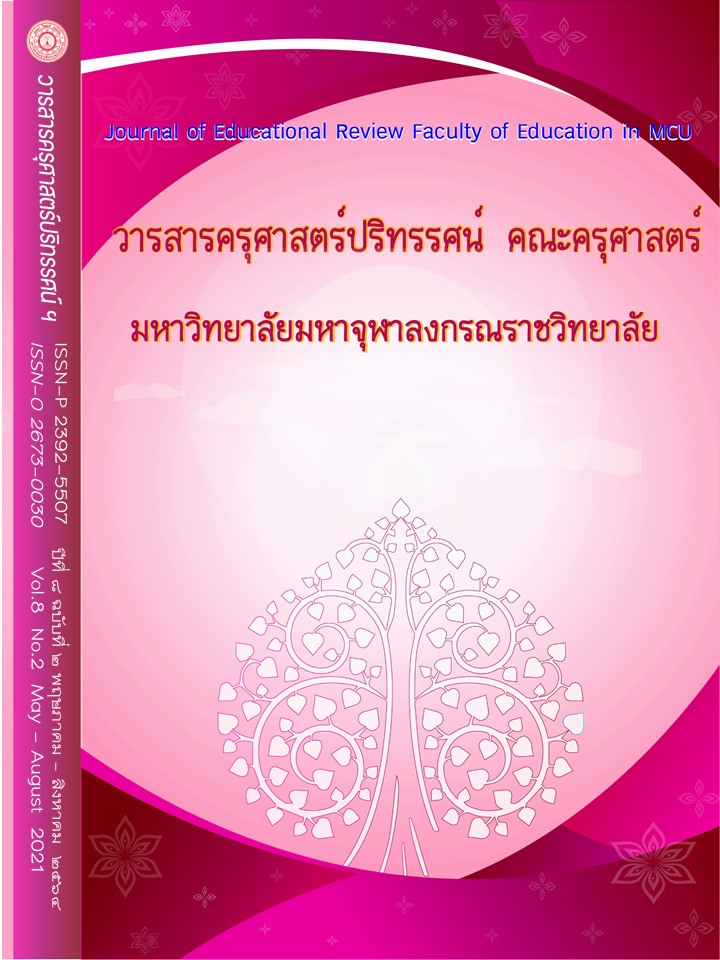THE GUIDELINE FOR INNOVATION LEARNING DEPARFMENT ENTERPRISE 4.0 ERA OF THE PHRAPARIYATTIDHAM SCHOOL
Main Article Content
Abstract
The objectives of this research were to study the components of innovative organizations in 4.0 era, and to propose guidelines for the development of innovative organizations in 4.0 era of Phrapariyattidhamma School, Department of General Education. The target group used in this research consisted of 17 experts with experience in educational administration and innovative organizations. The research instrument was interview form. The statistics used in the study were interquartile range and content analysis. Results showed that the components of innovative organizations in 4.0 era of Phrapariyattidhamma School, Department of General Education consisted of 15 key elements: 1) improvement of the innovation organizational structure, 2) the cooperation of vision, mission, and goals of the innovation organization, 3) focus on the importance of people, 4 ) creating motivation for innovation creation, 5) promoting schools as a learning organization, 6) human capital management, (7) corporate culture for promoting innovation, 8) creating an innovation ecosystem in the organization, (9) promotion creativity, (10) innovative leader, (11) effective teamwork, (12) knowledge management, 13) networking, 14) technology promotion, and 15) external factors. The development of innovative organizations in 4.0 era of Phrapariyattidhamma School, General Education Department consisted of 15 elements: 1) an approach to improving the structure of innovative organizations in 4.0 era, 2) guideline of cooperation in creating a vision, mission, goals, strategy of innovative organizations in 4.0 era, 3) guideline for focusing on the importance of personnel, 4) guidelines for creating motivation for innovation creation, 5) guidelines for promoting schools as an innovative learning organization to create innovation, 6) guidelines for human capital management, 7) guidelines for promoting organizational culture to create innovation, 8) guidelines for creating an innovative ecosystem in the organization, 9) guidelines for promoting creativity, 10) Guidelines for promoting innovative leaders, 11) guidelines for promoting effective teamwork, 12) guidelines for knowledge management for school personnel, 13) networking guidelines, 14) guidelines technology promotion, and 15) guidelines for promoting external factors which has shown interquartine range of each element between 0.50 - 1.00.
Article Details
ทัศนะและความคิดเห็นที่ปรากฏในบทความในวารสารฉบับนี้ถือเป็นความรับผิดชอบของผู้เขียนบทความนั้นเพียงผู้เดียว และไม่ถือเป็นทัศนะและความรับผิดชอบของกองบรรณาธิการ
กองบรรณาธิการขอสงวนสิทธิ์ในการคัดเลือกบทความลงตีพิมพ์และจะแจ้งให้เจ้าของบทความทราบหลังจากผู้ประเมินบทความตรวจอ่านบทความแล้ว
ต้นฉบับที่ได้รับการตีพิมพ์ในวารสารครุศาสตร์ปริทรรศน์ คณะครุศาสตร์ มหาวิทยาลัยมหาจุฬาลงกรณราชวิทยาลัย ถือเป็นกรรมสิทธิ์ของคณะครุศาสตร์ มหาวิทยาลัยมหาจุฬาลงกรณราชวิทยาลัย ห้ามนำข้อความทั้งหมดหรือบางส่วนไปพิมพ์ซ้ำ เว้นเสียแต่ว่าจะได้รับอนุญาตจากมหาวิทยาลัยฯ เป็นลายลักษณ์อักษร
References
กระทรวงศึกษาธิการ. (2560). แผนการศึกษาแห่งชาติ พ.ศ. 2560 – 2579. กรุงเทพมหานคร: พริกหวานกราฟฟิค.
กีรติ ยศยิ่งยง. (2552). องค์กรแห่งนวัตกรรม แนวคิดและกระบวนการ. กรุงเทพมหานคร: จุฬาลงกรณ์มหาวิทยาลัย.
กุศล ทองวัง. (2553). ความสัมพันธ์ของปัจจัยที่ส่งเสริมให้เกิดองค์การแห่งการเรียนรู้ต่อระดับการเป็นองค์การแห่งการเรียนรู้ และระดับการเป็นองค์การนวัตกรรม: กรณีศึกษาสำนักงานพัฒนาวิทยาศาสตร์และเทคโนโลยีแห่งชาติ. วารสารบริหารธุรกิจ. 33(128). 34-48.
นรวัฒน์ ชุติวงศ์ และณัฐสิทธิ์ เกิดศรี. (2554). การวิเคราะห์ปัจจัยที่มีอิทธิผลต่อการเป็นองค์กรแห่งนวัตกรรมในประเทศไทย. วารสารบริหารธุรกิจ. 34(130). 47-58.
พระวรธนกร กิตฺติญาโณ (แก้วพิลา), สมศักดิ์ บุญปู่, ระวิง เรืองสังข์ และสมหมาย จันทร์เรือง. (2561). การพัฒนาทักษะการบริหารสถานศึกษาสำหรับผู้บริหารโรงเรียนพระปริยัติธรรม แผนกสามัญศึกษา. วารสารครุศาสตร์ปริทรรศน์ คณะครุศาสตร์ มหาวิทยาลัยมหาจุฬาลงกรณราชวิทยาลัย. 5(3). 66-76.
รัตนวดี โมรากุล. (2560). การพัฒนารูปแบบองค์การแห่งนวัตกรรมของสถานศึกษาขั้นพื้นฐาน. ดุษฎีนิพนธ์ปรัชญาดุษฎีบัณฑิต. มหาวิทยาลัยราชภัฏนครปฐม.
วุฒิพงษ์ ภักดีเหลา. (2554). การศึกษาคุณลักษณะขององค์การนวัตกรรม : กรณีศึกษาองค์การที่ได้รับรางวัลด้านนวัตกรรม. วิทยานิพนธ์วิทยาศาสตรมหาบัณฑิต. สถาบันบัณฑิตพัฒนาบริหารศาสตร์.
สมนึก เอื้อจิระพงษ์พันธ์. (2553). รูปแบบการพัฒนาความสามารถในการจัดการความรู้ของผู้ประกอบการที่มีนวัตกรรมในประเทศไทย. ดุษฎีนิพนธ์วิทยาศาสตรดุษฎีบัณฑิต. จุฬาลงกรณ์มหาวิทยาลัย.
สำนักงานพระพุทธศาสนาแห่งชาติ. (2552). ข้อมูลพื้นฐานโรงเรียนพระปริยัติธรรม แผนกสามัญศึกษา. แหล่งที่มา https://www.onab.go.th/th/content/category/detail/id/88/iid/4239 สืบค้นเมื่อ 25 มี.ค. 2564.
สิริภักตร์ ศิริโท, รัตติญา ละเต็บซัน และวิวัฒน์ กิตติพงศ์โกศล. (2560). ความเป็นองค์กรนวัตกรรมของสถาบันอุดมศึกษาในประเทศไทย. วารสารบริหารธุรกิจเทคโนโลยีมหานคร. 14(1). 159-177.
สุกัญญา แช่มช้อย. (2555). แนวคิดเชิงนวัตกรรมสำหรับการบริหารสถานศึกษาในศตวรรษที่ 21. วารสารศึกษาศาสตร์ มหาวิทยาลัยนเรศวร. 14 (2). 117-128.
สุนีย์ ภิรมย์ประเมศ. (2551). การศึกษาเพื่อสำรวจองค์กรนวัตกรรม. วิทยานิพนธ์วิทยาศาสตรมหาบัณฑิต. มหาวิทยาลัยเทคโนโลยีพระจอมเกล้าธนบุรี.
อัปสร เสถียรทิพย์. (2554). องค์กรอัจฉริยะ องค์กรแห่งการเรียนรู้. วารสาร KM Lite. 4(3). 5-7.


